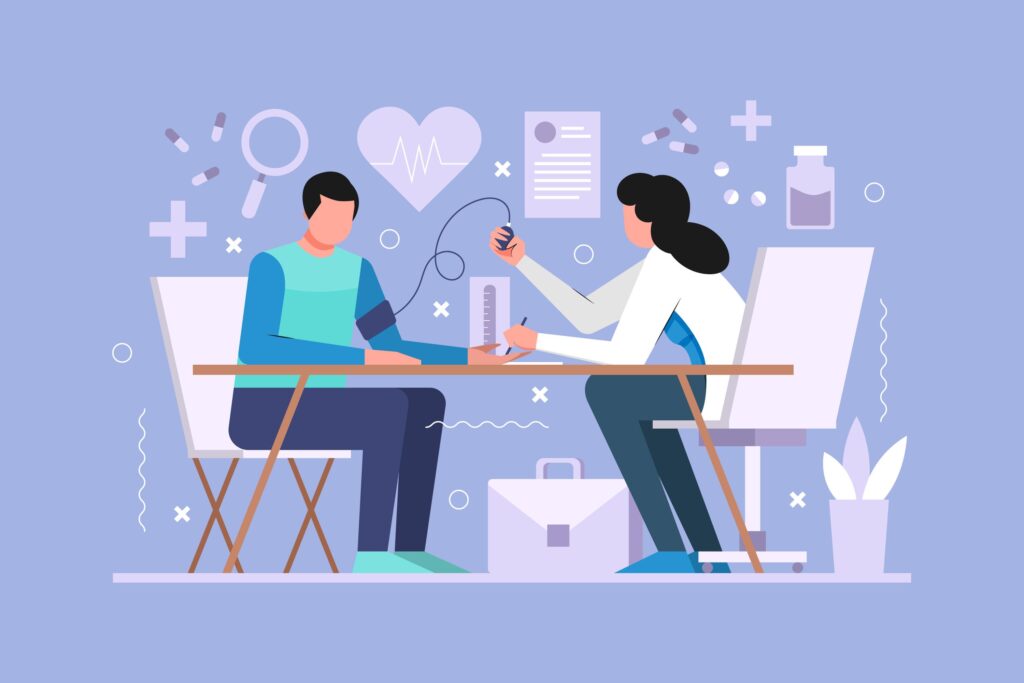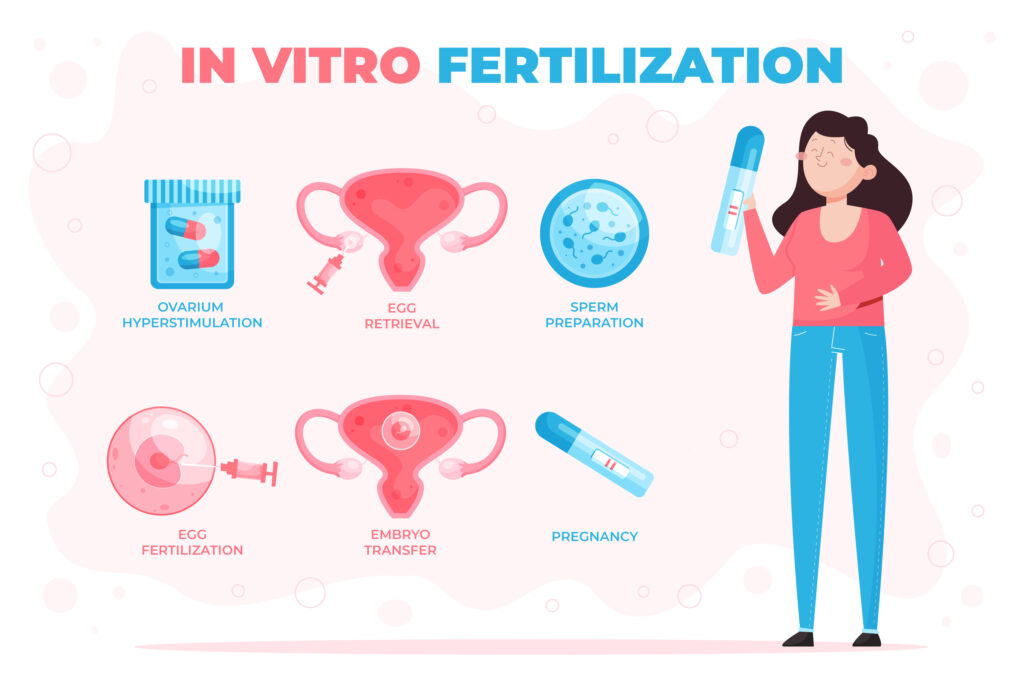
How to Increase Your Chances of Getting Pregnant?
Many couples face challenges during pregnancy, but with the right information and strategies, you can increase your chances of getting pregnant.
This blog will guide you through practical steps to boost your fertility, such as understanding your ovulation cycle and making healthy lifestyle choices. Whether you’re just starting to try or have been trying for a while, these tips can help increase your possibility of getting pregnant.
Let’s find out how you can turn your dreams of becoming a parent into reality with some simple but effective changes.
Understanding Your Fertility Cycle
Understanding your fertility cycle is important for reproductive health, whether you are trying to conceive or want to avoid pregnancy. Here is a detailed guide to understanding the different phases of the fertility cycle:

Track Your Menstrual Cycle:
- Keep a record of your menstrual cycle to identify patterns and find your most fertile days.
- Use apps or a calendar to mark the first day of your period each month.
Identify Your Ovulation Period:
- Use methods such as tracking basal body temperature (BBT), observing changes in cervical mucus, or using an ovulation predictor kit (OPK).
- Ovulation usually occurs about 14 days before your next menstrual period, but this can vary.
Timing Intercourse:
- Have regular sex during your fertile window (the 5 days before and after ovulation).
- Aim to have sex every other day during this period, to increase the chances of sperm meeting an egg.
Adopting a Healthy Lifestyle
It is really important to have a healthy lifestyle if you want to increase your chances of getting pregnant. Here are some basic tips that will help you create and stick to a healthy lifestyle that can make it easier to have a baby:

Maintain a Healthy Weight:
- Both underweight and overweight women may face difficulties conceiving. Aim for a body mass index (BMI) between 18.5 and 24.9. Being overweight can cause hormonal imbalances while being underweight can interfere with ovulation.
Eat a Balanced Diet:
Eating a balanced diet rich in vitamins and minerals can improve your fertility. Here are some key points to keep in mind:
- Fruits and Vegetables: Fruits and vegetables are rich in antioxidants. These antioxidants help protect your eggs and sperm from damage to their cells.
- Whole Grains: Whole grains provide you with important elements like vitamin B and iron.
- Lean Proteins: Lean proteins, such as chicken, fish, beans, and nuts, are good choices to ensure you get enough protein.
- Healthy Fats: Healthy fats, such as omega-3 fatty acids found in fish and flax seeds, can help make your reproductive system healthier.
Exercise Regularly:
- Do some light exercises which help in staying healthy and reducing the stress levels.
- Don’t exercise too much or too hard, as this can disrupt your menstrual cycle.
Limit Caffeine and Alcohol:
- Limit your caffeine intake to less than 200 milligrams per day, which is roughly the equivalent of one 12-ounce cup of coffee.
- Don’t drink alcohol as it can make it more difficult to get pregnant and cause problems if you do become pregnant.
Avoiding Harmful Substances
Avoiding harmful substances is very important if you want to boost your fertility and increase your possibility of being pregnant. Here is a simple guide on how to stay away from things that can harm your reproductive health:

Quit Smoking:
- Smoking is harmful for both men and women who want to have children. It can make it difficult for men to make good sperm and for women to make healthy eggs. Smoking can also disrupt the hormones that help us have children.
- Get support from doctors or programs that help you quit smoking.
Avoid Recreational Drugs:
- The use of marijuana, cocaine, and other recreational drugs can make it more difficult to get pregnant and increase the chance of problems during pregnancy.
- If you have an addiction to drugs or alcohol, don’t hesitate to ask for help.
Limit Exposure to Environmental Toxins:
- Reduce exposure to pesticides, herbicides, heavy metals and other harmful chemicals around you.
- Use natural cleaning products and organic items whenever possible.
- Choose personal care products that don’t contain harmful chemicals like parabens, phthalates, and fake fragrances.
Regular Medical Check-Ups
Regular visits to the doctor can help detect and correct any fertility problems early.

Preconception Check-Up
Preconception testing is like a complete health check for both partners before having children. It helps doctors understand how healthy you are and whether there are any problems that could make it difficult to get pregnant or affect pregnancy later on. The tests look at everything from your general health to specific things that could affect fertility or pregnancy. The goal is to give you and your partner advice on how to make sure you’re in the best possible position to start a family.
Genetic Testing
Genetic testing checks for health problems that run in your family and may affect your baby. It tells you if your baby may inherit certain conditions. This helps you plan your pregnancy and prepare for any extra support your baby may need.
Timing Intercourse
Knowing when to have sex is very important if you want to increase your chances of getting pregnant.
Frequent Intercourse
Having regular sex during your period increases your possibility of getting pregnant. Try to have sex every 2 to 3 days.
Timing Around Ovulation
It’s best to have sex before and during ovulation because sperm can survive inside a woman’s body for up to 5 days. The time when you’re most likely to get pregnant is from about 5 days before to 1 day after ovulation. So, if you’re trying for a baby, aim to have intercourse during this time for the highest chance of success.
Related Blogs:- Know Everything About IVF Cycle
Assisted Reproductive Technologies (ART)
Assisted reproductive technologies may be considered if natural methods don’t work.
In Vitro Fertilization (IVF)
IVF is a process in which eggs are fertilized by sperm outside the body and then implanted in the uterus. It is one of the most effective ART methods, but it can be expensive and emotionally demanding.

Intrauterine Insemination (IUI)
IUI involves inserting sperm directly into the uterus at the time of ovulation. It is less invasive and cheaper than other ART options.

Optimizing Male Fertility
Improving male fertility requires several lifestyle changes and medical interventions. Here is a brief guide:
Maintain a Healthy Weight:
It is important to maintain a healthy weight, as being overweight makes it harder for the body to make good sperm.
Eat a Nutritious Diet:
Try taking supplements such as zinc, vitamin C, and coenzyme Q10. These may help improve sperm health.
Stay Hydrated:
Drink plenty of water to improve overall health and sperm production.
Avoid Heat Exposure:
Avoid spending too much time in hot tubs or saunas and try not to wear tight clothing. Keeping the testicles cool can increase your chances of getting pregnant.
Healthy sexual practices:
To ensure that the sperm stays healthy and ready, continue to have sex regularly.
Seeking Medical Assistance
It is important for couples facing difficulty conceiving to seek medical help for fertility concerns. Here is a brief guide:

Timely Evaluation:
- If you are under 35 years of age and have not been able to get pregnant after trying for a year, consult a doctor. If you are 35 years of age or older, it is a good idea to see a doctor if you have not been successful even after trying for six months.
Consult a Specialist:
- Make an appointment with a fertility doctor or reproductive specialist for a full check-up.
Diagnostic Tests:
- Get tests to find out how many sperm you have, what your hormone levels are, and whether you’re ovulating for both partners.
Treatment Options:
- Learn about fertility treatments like medication, intrauterine insemination (IUI), or in vitro fertilization (IVF).
Follow-Up Care:
- After meeting with a fertility specialist, keep up with your regular checkups and follow the treatment plan they prescribe. This helps ensure that everything is moving in the right direction and gives you the best chance of success.
Read Also This Blog:- Pre-IVF Treatment Checkups
Managing Stress
Managing stress is important for both physical and emotional health, especially when trying to conceive. Here’s a brief guide:
Identify Causes of Stress:
- Identify sources of stress in your life, such as work, relationships, or fertility concerns.
Practice Relaxation Techniques:
- Try incorporating relaxation techniques like deep breathing, meditation, yoga, or mindfulness into your daily routine.
Physical Activity:
- Get regular exercise to reduce stress and promote overall health.
Set Boundaries:
- Learn to say no to extra commitments and prioritize self-care.
Hobbies and Interests:
- Do activities that bring you joy and relaxation, whether it’s reading, gardening, or spending time outdoors.
Seek support:
- Talk to friends, family, or support groups for encouragement and understanding.
Professional Help:
- Consider talking to a therapist or counsellor to learn ways to better handle stress and cope with it.
Mind-Body Techniques:
- Use techniques such as acupuncture, massage or guided imagery to promote relaxation and reduce stress levels.
Conclusion
In conclusion, maximizing your chances of conceiving involves understanding your fertility cycle, adopting a healthy lifestyle, avoiding harmful substances, and seeking medical help when needed.
At Uvara Fertility Centre, Gurgaon’s leading IVF Centre, we understand that the journey to parenthood can be challenging. Our team offers compassionate care, advanced fertility techniques like IVF and IUI, and personalized treatment plans to help you fulfil your dream of having a child.
With dedication, support, and expert guidance, we empower you to move forward on the path to parenthood with confidence. Trust Uvara Fertility Centre to be your partner in this transformative journey of building your family.
Content Created By:

Cyberbizz Technologies
Team - Content Curator

